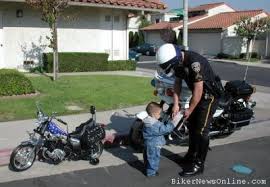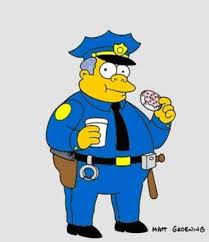 Most people who get caught speeding just seem to pay their tickets without protest and suffer the point accumulation and higher insurance rates. That's perfectly acceptable if you're one of those people who learns a lesson from the experience of being pulled over and subjected to public ridicule from the other drivers while the officer does a special background investigation and writes a dissertation about the heinous crime of 80 in a 65. However, you don't have to pay without due process (in most states). But before we get into what to do to beat the ticket, let's talk about what not to do at a traffic stop.
Most people who get caught speeding just seem to pay their tickets without protest and suffer the point accumulation and higher insurance rates. That's perfectly acceptable if you're one of those people who learns a lesson from the experience of being pulled over and subjected to public ridicule from the other drivers while the officer does a special background investigation and writes a dissertation about the heinous crime of 80 in a 65. However, you don't have to pay without due process (in most states). But before we get into what to do to beat the ticket, let's talk about what not to do at a traffic stop. 1) Do not argue with the officer.

A cop does not have the authority to debate the law with you. His job is to enforce the law by detecting and apprehending violators. And besides, unless you are a lawyer, judge or another cop yourself, you'll very likely lose the argument, get your ticket and gain no advantage from the experience.
2) Do not make snide comments or otherwise try to antagonize the officer.
Cops love this stuff. Imagine the sheer boredom of sitting in a median listening to police radio, watching cars go by for hours. Don't you think this fellow would like to go back to the precinct with a story to tell to his buddies at shift change? Any remark you make will most certainly be used against you when you do show up for court. If you want to ridicule the officer for his low IQ or poor career choice or his resemblance to some scavenger bird, you'll probably be better off paying your ticket by mail.
3) Do not fumble through your glove box.
Try to have all required documentation in your hand by the time the officer approaches your vehicle. He/she is used to people doing this but gains no patience or tolerance from the frequency of it. You know what he's going to ask for; just have it ready and waiting when the time comes. This will be to your advantage. Part of the game cops play is simply power. If you make him wait for you, you're taking some of his power. He'll do whatever he can to get it back. By acknowledging his authority, you stand a better chance of receiving whatever break he/she might be inclined to give. Rule of thumb: Keep your updated registration and insurance documentation (if required to be presented) within easy reach of your position. It's not a good idea to be stretching across your vehicle reaching for something. Cops think you're reaching for your Glock. Don't be a victim of poor preparation.
4) Do not give the officer anything negative to remember you by.
Being visibly upset or impatient has no value here. You are being cited for breaking the law. Showing your contempt for the law, the officer, the government, the establishment or all of the above will not work in your favor.
5) Don't give the officer more power than he already has.

Many cops will try to take advantage of your misfortune by doing little things to enhance the annoyance factor and try to knock you further off balance with your own anger. For example, an officer will pull in behind you during a stop, turn on the search light and aim it directly at your side view mirror. Someone please tell me what purpose this serves other than annoying the driver. Personally, as soon as I come to a stop, I divert the mirror as far downward as possible before the pig turns on the light. I've seen them trying in vain to find the spot unsuccessfully. They'll change to the rear view, I'm way ahead of 'em there, too. So far, I haven't been called to task. There's no legal requirement to point your mirrors in any particular direction. If you want to be as low key as possible, just lean out of the way. Once, I even aimed the mirror back at the officer in his car. Still no response (verbally).
Go to Court
In states where speeding is still a criminal offense, you have the right (some would say the obligation) to appear in court and defend yourself against prosecution. It is by no means a forgone conclusion that you'll be found guilty. In my state, your ticket will be handed to you with a court date already scheduled. Some states require you to schedule the court date yourself. And yet others have decriminalized speeding and have designated speeding a civil offense and your rights under criminal law have been removed. Therefore, you pay your ticket or suffer the consequences. Your insurance will still go up and you will still be that much closer to losing your driver's license. At any rate, if the state in which you receive your ticket is one that has not decriminalized speeding, it may be to your advantage to go to court. Obviously, if you're nabbed in Nebraska on a road trip between Seattle and Atlanta, you probably aren't going to be available on the court date but if it's convenient and feasible, by all means, go.

First of all, the state is required to produce evidence against you. This can only be done by the "arresting officer". That's the cop who wrote the ticket. He's generally the only witness for the state. Most of the time he/she will be there but if not, you may ask the judge that the case be dismissed due to a lack of prosecution. The one time this happened to me, I didn't even have to ask. I approached the bench when called, the judge immediately realized the policeman was not in attendance and promptly dismissed the case and wished me a good day. That was in Michigan. I've been pulled over numerous times in Virginia, been to court every time and the officer always managed to make it. Mainly because each officer in Virginia has his/her own assigned court dates. On those dates, the officer basically spends his day as a witness prosecuting traffic violations. Once, an officer showed up on his day off in full uniform just to present his case against me for 65 in a 50. I guess he didn't like his convictions being overturned on appeal.

If you decide to go to court, you'll have choices as to what to plead: guilty, not guilty or nolo contendre. Pleading guilty will generally result in exactly what you would expect, a quick judgement against you and you'll owe some money. Pleading not guilty will result in the state or other government entity presenting their case against you. This will usually be a recounting of the date, time and particulars of the case with particular attention paid to the method used to ascertain your speed. This typically includes a statement by the officer that the radar was calibrated before, during and after the stop. It's probably a lie but it will never be challenged by a judge. Unless you are a lawyer, I don't recommend challenging this. Judges generally accept radar detection as indisputable evidence and this rehearsed speech about calibration of the device as gospel. Don't try to debunk either unless you have rock solid scientific evidence against the radar results or the truthfulness of the rehearsed speech.
Most counties have a law library where you may be able to discover holes in the case against you if there are any irregularities.
Don't go in armed with only rumors and myth. For example, I have heard that you can have a case dismissed if there is the slightest mistake on the ticket. Wrong! Almost every ticket will have some mistakes. Judges see this as a minor issue in these cases. Don't bring it up. You'll get no sympathy unless the ticket has a wrong date, wrong name (not a misspelling) or wrong license number. Cops are quite careful in their ticket writing and judges are quite unconcerned with minor mistakes.
If you plead not guilty and are found guilty, you may have the right to an appeal. Go for it. The burden of prosecution is still on the state, county or city. Same rules apply. I might suggest requesting a jury trial but I haven't had the experience and can't say what the results might be. Perhaps someone reading may have gone through this and be able to enlighten us all.

My best advice: Don't go more than ten mph over the limit.
I finally learned my lesson after many years of defiance. The way to take away the power of the state is not to invite their attention to your activities, period.
You might say the title I chose for this post is misleading. Perhaps. But I would rather mislead with the title than with content. I have as much experience at fighting tickets as just about any non-lawyer you'll ever meet and my conclusion is without question the best legal advice you'll ever get for free.